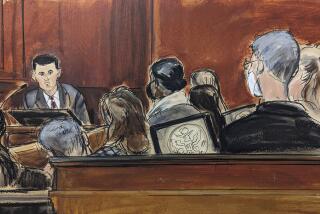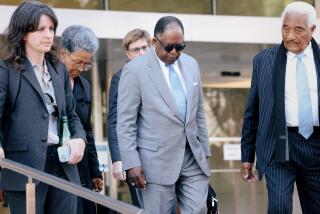Closing Arguments End in Keating Trial
- Share via
Charles H. Keating Jr.’s lawyer characterized the state’s securities fraud case against his client Friday as a “hodgepodge of circumstantial evidence” that relies on speculation and “inference piled on inference.”
In his closing argument, defense lawyer Stephen C. Neal told jurors that prosecutors failed to present any evidence that Keating knew of any false statements or omissions of material information in the sale of his company’s bonds through branches of Irvine-based Lincoln Savings & Loan.
He also asserted that no evidence was presented during the nine-week trial to show that Keating, the former chairman of Lincoln’s parent company, American Continental Corp., intended to deceive bondholders or took any actions to aid in deceiving them.
The prosecution’s “whole case is that Charlie Keating controlled the flow of information” and that he therefore “must have known” about misrepresentations, Neal said.
But Keating did not control the entire flow of information, especially when it came to bond sales, Neal said. The lawyer cited former Lincoln President Ray C. Fidel’s testimony that Fidel relied on lawyers, not Keating, in directing what information was to be included in the bond sales brochures and sales pitches.
Meantime, outside the courtroom after the morning session, a small group of angry bondholders risked a mistrial when they gathered before cameras and loudly berated Neal’s arguments as a number of jurors walked by.
“I’m so angry I could spit tacks and build houses,” seethed bondholder Jeri Mellon of Sherman Oaks.
Los Angeles Superior Court Judge Lance A. Ito spent the first 45 minutes of the afternoon session questioning several jurors in private on what they saw and heard and whether it would influence their deliberations. Final arguments continued after he was satisfied that the jurors weren’t prejudiced by the outburst.
In his summation, Neal also put on trial the very laws that the company used to sell more than $250 million in bonds. He pointed out that the company followed the law in every respect, including a prohibition on using licensed brokers to sell the bonds.
Neal also called into question the roles and motives of thrift regulators, who often were caught in contradictory statements. He hinted that the bitter relationship between regulators and Keating might have begun when a federal examiner let a Lincoln executive know that his superiors were forcing him to redo an examination until he found something negative.
Ito will instruct the jury Monday on the law that applies to the case.
More to Read
Sign up for Essential California
The most important California stories and recommendations in your inbox every morning.
You may occasionally receive promotional content from the Los Angeles Times.













![Vista, California-Apri 2, 2025-Hours after undergoing dental surgery a 9-year-old girl was found unresponsive in her home, officials are investigating what caused her death. On March 18, Silvanna Moreno was placed under anesthesia for a dental surgery at Dreamtime Dentistry, a dental facility that "strive[s] to be the premier office for sedation dentistry in Vitsa, CA. (Google Maps)](https://ca-times.brightspotcdn.com/dims4/default/07a58b2/2147483647/strip/true/crop/2016x1344+29+0/resize/840x560!/quality/75/?url=https%3A%2F%2Fcalifornia-times-brightspot.s3.amazonaws.com%2F78%2Ffd%2F9bbf9b62489fa209f9c67df2e472%2Fla-me-dreamtime-dentist-01.jpg)